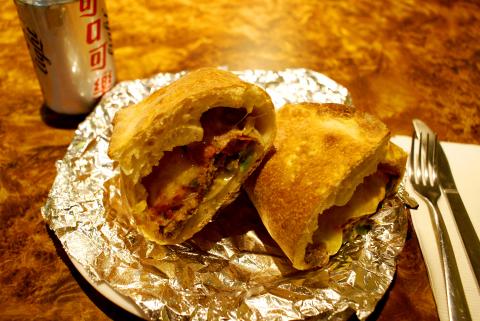“Best Stromboli you ever have!” reads the catchy caption at the top of Amore Pizzeria’s menu. That wouldn’t have been hard — I’d never had a Stromboli before entering Amore, which opened last month across the street from National Taiwan University on Xinhai Road. But after one bite of the fragrant, moist and meaty concoction that was presented to me 10 minutes after ordering, I was glad I had ordered it.
And there’s more to Amore. “Best pizza in town!” boasts a sign out front — fightin’ words. But they aren’t merely hyperbole. The homemade dough was rolled and baked into a crust that was just the right thickness, slightly crispy around the crimping and underneath, and chewy everywhere else. Mozzarella and a homemade sauce, infused with Italian herbs, covered the pie.
Amore Pizzeria’s space is plain — so plain that one could easily confuse it, as I initially did, for just another cheap knock-off pizza joint playing off guileless university students wanting a quick bite. Brown is the color of choice here: brown booths, brown tables, brown chairs and brown stools running along a brown bar. A few framed pictures — Michelangelo’s David, a caprese salad — break up the monotony.

Photo: Noah Buchan, Taipei Times
Though the decor is drab, Amore’s amiable owner, James Chen (陳建堂), knows what he’s doing. Having learned to cook Italian food in the early 1980s in New Jersey from an old Italian who ran six restaurants, Chen spent the past three decades perfecting what he does best: pizza.
He shuttered his three New Jersey shops in 2008 following the financial downturn, returned to Taipei after a 30-year hiatus and found the pizza here was not to his liking. “What is this ketchup and sugar?” he says.
Chen uses extra-virgin olive oil in his dough (which he blesses, Catholic style, before quartering it off and rolling it up) and in his Caesar salad dressing (which had a rich anchovy and caper finish). He makes the sausage and meatballs himself from scratch — again, learned from the New Jersey Italian — as he does the pasta sauces.
Stromboli is a turnover pizza similar to a calzone, but its dough is thicker. Chen said calzones are often made with ricotta, whereas Stromboli are made with mozzarella. The base is a vegetarian combination of onion, green pepper, tomato sauce and cheese, to which I added pepperoni and sausage (NT$320).
First, a warning: The Stromboli comes to the table piping hot and doesn’t cool off for quite a while, which can be dangerous. Generous slices of slightly spicy pepperoni and peppery sausage were evenly placed throughout the inside, so that a meaty morsel was found in every bite of bread.
Amore’s 12-inch supreme pizza (NT$480) earns its moniker. I haven’t seen so many toppings — sausage, meatball, pepperoni, green pepper and onion — for a long time. It may be possible that there are too many toppings. A rare case of too much of a good thing.

President William Lai (賴清德) yesterday delivered an address marking the first anniversary of his presidency. In the speech, Lai affirmed Taiwan’s global role in technology, trade and security. He announced economic and national security initiatives, and emphasized democratic values and cross-party cooperation. The following is the full text of his speech: Yesterday, outside of Beida Elementary School in New Taipei City’s Sanxia District (三峽), there was a major traffic accident that, sadly, claimed several lives and resulted in multiple injuries. The Executive Yuan immediately formed a task force, and last night I personally visited the victims in hospital. Central government agencies and the

Australia’s ABC last week published a piece on the recall campaign. The article emphasized the divisions in Taiwanese society and blamed the recall for worsening them. It quotes a supporter of the Taiwan People’s Party (TPP) as saying “I’m 43 years old, born and raised here, and I’ve never seen the country this divided in my entire life.” Apparently, as an adult, she slept through the post-election violence in 2000 and 2004 by the Chinese Nationalist Party (KMT), the veiled coup threats by the military when Chen Shui-bian (陳水扁) became president, the 2006 Red Shirt protests against him ginned up by

As with most of northern Thailand’s Chinese Nationalist Party (KMT) settlements, the village of Arunothai was only given a Thai name once the Thai government began in the 1970s to assert control over the border region and initiate a decades-long process of political integration. The village’s original name, bestowed by its Yunnanese founders when they first settled the valley in the late 1960s, was a Chinese name, Dagudi (大谷地), which literally translates as “a place for threshing rice.” At that time, these village founders did not know how permanent their settlement would be. Most of Arunothai’s first generation were soldiers

Among Thailand’s Chinese Nationalist Party (KMT) villages, a certain rivalry exists between Arunothai, the largest of these villages, and Mae Salong, which is currently the most prosperous. Historically, the rivalry stems from a split in KMT military factions in the early 1960s, which divided command and opium territories after Chiang Kai-shek (蔣介石) cut off open support in 1961 due to international pressure (see part two, “The KMT opium lords of the Golden Triangle,” on May 20). But today this rivalry manifests as a different kind of split, with Arunothai leading a pro-China faction and Mae Salong staunchly aligned to Taiwan.